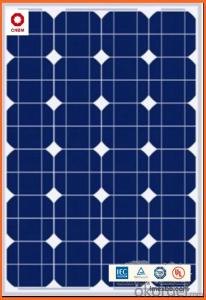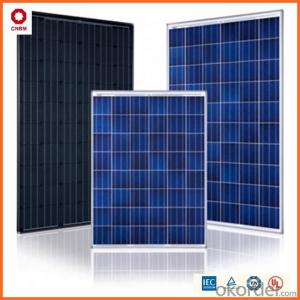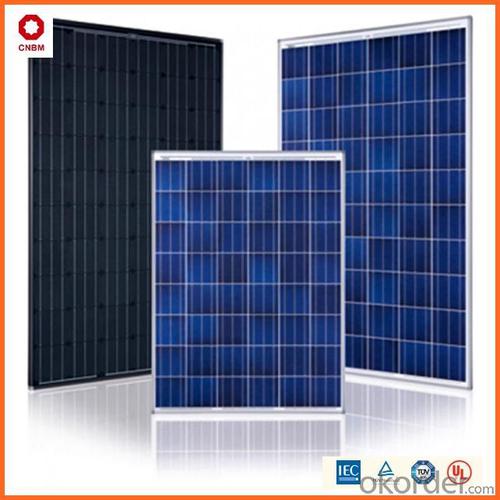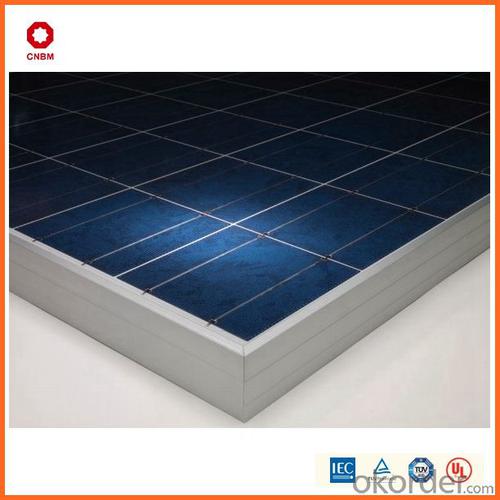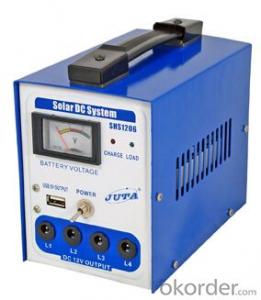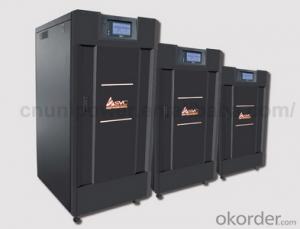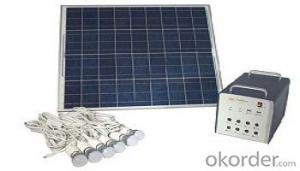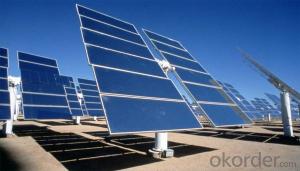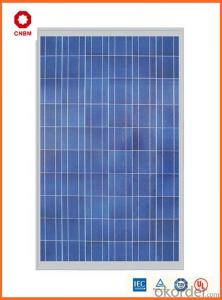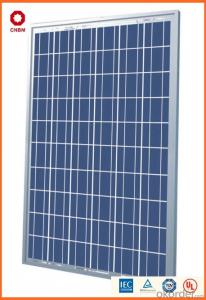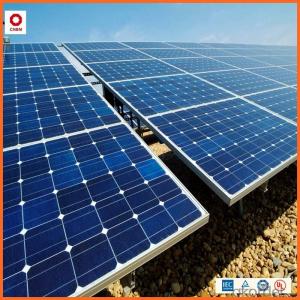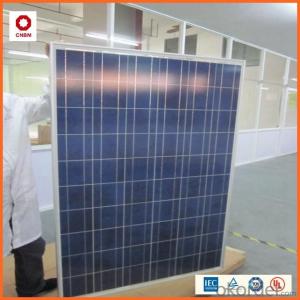Residential Solar Energy Systems:Small Solar Panel 45w with Good Quality - Hot on Sale!!!
- Loading Port:
- China main port
- Payment Terms:
- TT OR LC
- Min Order Qty:
- 1 watt
- Supply Capability:
- 10000000 watt/month
OKorder Service Pledge
OKorder Financial Service
You Might Also Like
Product Description:
Hot Sale !!! Quality and Safety of Small Poly Solar Panel 35~85w
1. Rigorous quality control meets the highest international standards.
2. High-transmissivity low-iron tempered glass, strong aluminium frame.
3. Using UV-resistant silicon.
4. IS09001/14001/CE/TUV/UL
Warranties of Small Poly Solar Panel 35~85w
1. 10 years limited product warranty
2. 15 years at 90% of the minimal rated power output
3. 25 years at 80% of the minimal rated power output
Technical date of 45w-85w Poly Solar Panel
ITEM NO.: | Mono 125*125 cell ,36pcs . Power range from 80Wp-100Wp | ||||||||
Maximum Power(W) | 80 | 85 | 90 | 95 | 100 | ||||
Optimum Power Voltage(Vmp) | 17.81 | 17.89 | 17.94 | 17.99 | 18.06 | ||||
Optimum Operatige Current(Imp) | 4.78 | 4.91 | 5.12 | 5.35 | 5.59 | ||||
Open Circuit Voltage(Voc) | 21.98 | 22.05 | 22.14 | 22.28 | 22.45 | ||||
Short Circuit Current(Isc) | 4.95 | 5.15 | 5.36 | 5.65 | 5.84 | ||||
Solar Cell: | 125*125 Mono | ||||||||
Number of Cell(pcs) | 4*9 | ||||||||
Brand Name of Solar Cells | JA Cell, Bluesun Cell | ||||||||
Size of Module(mm) | 1580*808*35 | ||||||||
Caple & Connector Type | Pass the TUV Certificate | ||||||||
Frame(Material Corners,etc.) | Aluminium-alloy | ||||||||
Backing (Brand Type) | TPT | ||||||||
Cell Efficiency for 100W(%) | 15.8% | ||||||||
Weight Per Piece(KG) | 12.0KG | ||||||||
FF (%) | 70-76% | ||||||||
Junction Box Type | Pass the TUV Certificate | ||||||||
Tolerance Wattage(e.g.+/-5%) | ±3%, or 0-3% | ||||||||
Front Glass Thikness(mm) | 3.2 | ||||||||
Temperature Coefficients of Isc(%) | +0.04 | ||||||||
Temperature Coefficients of Voc(%) | -0.38 | ||||||||
Temperature Coefficients of Pm(%) | -0.47 | ||||||||
Temperature Coefficients of Im(%) | +0.04 | ||||||||
Temperature Coefficients of Vm(%) | -0.38 | ||||||||
Temperature Range | -40°C to +85°C | ||||||||
Surface Maximum Load Capacity | 2400Pa | ||||||||
Allowable Hail Load | 23m/s ,7.53g | ||||||||
Bypass Diode Rating(A) | 12 | ||||||||
Warranty | 90% of 10 years,80% of 25 years. | ||||||||
Standard Test Conditions | AM1.5 1000W/ 25 +/-2°C | ||||||||
Packing | carton or pallet | ||||||||
1*20' | 25 Pallets / 450pcs | ||||||||
1*40'STD | 25 Pallets / 100pcs | ||||||||
Features of our products:
• High conversion efficiency mono/poly-crystalline amorphous silicon solar cells
• Modules incorporate high performance bypass diodes to minimize the power drop caused by shading
• High transmittance, low-iron tempered glass
• High performance EVA encapsulant to prevent destroying and water.
• AI frame: without screw, corner connection. 8 holes on the frame can be installed easily
• Good performance of preventing from atrocious weather such as wind and hails
• Certifications: CE IEC TUV VDE UL, Class I
• 10 years 90% power output warranty

Shipping of Small Poly Solar Panel 35~85w
By Sea | Delivery from Shanghai or Ningbo seaport |
By Air | Departure from Shanghai Pudong Airport |
By Express | Post by DHL, EMS, UPS, TNT. |
- Q: Can solar energy systems be used to power an entire household?
- Yes, solar energy systems can be used to power an entire household. With sufficient solar panels and a properly sized battery storage system, a solar energy system can generate enough electricity to meet the energy needs of a household. Additionally, excess energy produced during the day can be stored in batteries and used during nighttime or cloudy days, ensuring a continuous power supply.
- Q: What is the impact of shading on solar energy systems?
- Shading on solar energy systems can significantly reduce their efficiency and overall energy production. When solar panels are partially or fully shaded, it can lead to a decrease in the amount of sunlight they receive, resulting in a decrease in the amount of electricity generated. Shading can cause uneven distribution of sunlight across the panels, leading to reduced output and potential damage to the system. Therefore, it is crucial to carefully consider the placement and design of solar energy systems to minimize shading and maximize their effectiveness.
- Q: Can a solar energy system be installed on a flat roof?
- Certainly! Installing a solar energy system on a flat roof is indeed possible. In fact, flat roofs are often regarded as the perfect choice for solar panel installations due to their easy accessibility and unhindered exposure to sunlight. The installation process for flat roofs is relatively straightforward, as the panels can be directly mounted on the surface without requiring any additional structural modifications. Moreover, the angle and positioning of the solar panels can be optimized to maximize energy generation. However, it is crucial to take into account factors such as the roof's load-bearing capacity, available space, and potential shading problems during the installation planning phase. Seeking guidance from a professional solar installer or engineer can ensure a successful installation on a flat roof.
- Q: Can solar energy systems be used in areas prone to earthquakes?
- Yes, solar energy systems can be used in areas prone to earthquakes. Solar panels are designed to withstand various weather conditions, including seismic events. Additionally, unlike traditional power infrastructure, solar energy systems are decentralized, reducing the risk of large-scale power outages during earthquakes. However, it is important to ensure proper installation and maintenance to ensure the resilience of solar energy systems in earthquake-prone areas.
- Q: Can solar energy systems be used in powering retirement homes or assisted living facilities?
- Yes, solar energy systems can certainly be used to power retirement homes or assisted living facilities. In fact, solar energy can be a highly beneficial and cost-effective solution for these types of facilities. Retirement homes and assisted living facilities have a high energy demand due to the need for heating, cooling, lighting, and various electrical appliances. By installing solar panels on the rooftops or in suitable areas, these facilities can generate their own electricity and reduce their reliance on the grid. Solar energy systems can help these facilities reduce their operating costs significantly, as they can offset a considerable portion of their electricity bills. This is especially important for retirement homes and assisted living facilities, as they often operate on tight budgets and need to allocate resources efficiently. By harnessing solar power, these facilities can redirect the saved funds towards providing better care and services for their residents. Furthermore, solar energy systems contribute to a cleaner and greener environment. Retirement homes and assisted living facilities have a responsibility towards their residents' well-being, and by using solar power, they can reduce their carbon footprint and promote sustainability. This can have a positive impact on the health and overall quality of life for the residents. Additionally, solar energy systems can provide a reliable source of power during emergencies or power outages. Particularly in areas prone to extreme weather events, where power disruptions are more common, having a solar energy system with battery storage can ensure continuous and uninterrupted power supply to critical areas such as medical equipment, lighting, and HVAC systems. In conclusion, solar energy systems are a viable and beneficial option for powering retirement homes or assisted living facilities. They can significantly reduce operating costs, promote sustainability, and provide a reliable source of power, ultimately improving the quality of care and services provided to residents.
- Q: What is net metering and how does it work with solar energy systems?
- Net metering is a billing arrangement that allows solar energy system owners to receive credit for the excess electricity they generate and feed back into the grid. With net metering, when a solar energy system produces more electricity than is being consumed, the excess energy is sent back to the power grid, and the homeowner or business owner receives a credit on their utility bill. This credit can then be used to offset the cost of electricity when the solar system is not generating enough power, such as during nighttime or cloudy days. Essentially, net metering ensures a fair and efficient exchange of electricity between the solar system owner and the utility company, making solar energy systems more economically viable and accessible.
- Q: Can solar energy systems be used for powering electric car manufacturing plants?
- Indeed, electric car manufacturing plants can utilize solar energy systems. These systems harness the power of sunlight to generate electricity, which can then be utilized for diverse industrial operations, including the functioning of manufacturing plants. By implementing solar panels on the rooftops or open areas of the manufacturing facility, the plant can effectively tap into renewable energy to satisfy its electricity requirements. This not only diminishes the dependency on fossil fuels but also aids in curbing greenhouse gas emissions linked to conventional electricity generation. Moreover, by integrating energy storage solutions, solar energy systems ensure a consistent power supply, even during periods of limited sunlight or nighttime. Consequently, opting for solar energy systems to power electric car manufacturing plants is a sustainable and environmentally conscious decision.
- Q: Can solar energy systems be used for powering refrigeration systems?
- Yes, solar energy systems can be used for powering refrigeration systems. Solar energy can be converted into electricity through solar panels, which can then be used to power refrigeration systems. This is commonly done through the use of photovoltaic (PV) systems, where sunlight is converted into electricity using semiconducting materials. The electricity generated by these systems can be used to power the compressors and other components of refrigeration systems, allowing them to operate without relying on traditional power sources. By utilizing solar energy for refrigeration, not only can energy costs be reduced, but also the environmental impact can be minimized, as solar energy is a clean and renewable source of power.
- Q: Are there any risks of electrical shock with solar energy systems?
- Yes, there are potential risks of electrical shock associated with solar energy systems. While solar energy systems are generally considered safe, the presence of high voltages and electrical currents within these systems can pose a risk if not properly managed or handled. Some of the key risks include: 1. Installation and maintenance: During the installation and maintenance of solar panels, there is a risk of coming into contact with live electrical components. This can occur if proper safety procedures are not followed, or if individuals without proper training attempt to handle electrical connections. 2. Faulty equipment or wiring: Malfunctioning or faulty equipment, such as inverters or wiring, can increase the risk of electrical shock. Poor installation practices or inadequate maintenance can also lead to electrical faults, which may expose individuals to dangerous electrical currents. 3. Fire hazards: Although not directly related to electrical shock, faulty electrical components or wiring can increase the risk of fire in solar energy systems. Fires can further exacerbate the risk of electrical shock if individuals attempt to extinguish them without shutting down the electrical system first. To mitigate these risks, it is crucial to follow proper installation and maintenance procedures, which often include working with a licensed professional. Additionally, individuals working with solar energy systems should be trained on proper safety protocols, such as wearing appropriate personal protective equipment and ensuring electrical systems are properly grounded. It is also important to regularly inspect and maintain solar energy systems to identify and address any potential electrical hazards.
- Q: Are there any tax credits available for solar energy systems?
- Yes, there are tax credits available for solar energy systems. The federal government offers a federal solar investment tax credit (ITC) that allows homeowners and businesses to deduct a percentage of the installation cost of a solar energy system from their federal taxes. Additionally, some states, local governments, and utility companies may also offer their own tax incentives for solar energy systems.
Send your message to us
Residential Solar Energy Systems:Small Solar Panel 45w with Good Quality - Hot on Sale!!!
- Loading Port:
- China main port
- Payment Terms:
- TT OR LC
- Min Order Qty:
- 1 watt
- Supply Capability:
- 10000000 watt/month
OKorder Service Pledge
OKorder Financial Service
Similar products
Hot products
Hot Searches
Related keywords
